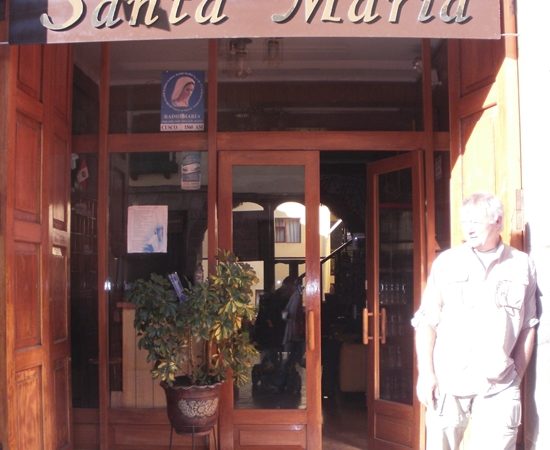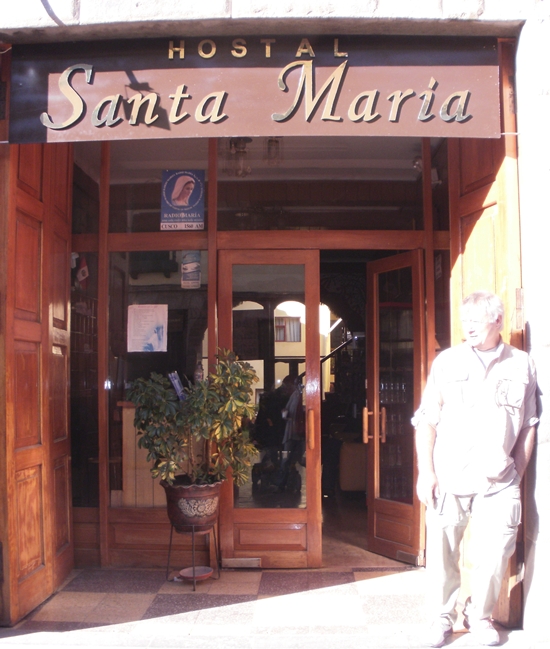
Note from Molly: We traveled for 4 1/2 years in South America, and published a free eBook: Cheap Places in South America & Budget Travel Tips. This is from the ‘How To Save Costs on Housing’ chapter.
Arriving in a major city or tourist town with no game plan is the most expensive – and riskiest – way to travel. Before you step off that bus, train or plane, check online for an inexpensive hostal or hotel and make a reservation in advance.

This insures that not only do you have a place to sleep, but also that the establishment is open. It’s no secret that guidebook listings are notoriously out-of-date, sending backpackers knocking on doors at locations that have been out of business for months or years.
I know, I have been one of those backpackers on many occassions.
Me: “Hotel La LUNA, sir… it is supposed to be on this street.”
Innocent local: “Oh, they closed two years ago…”.
Online booking agencies such as Booking.com or HostelBookers.com are a good place to start. Or you can do a generic search for the area on Google (enter in ‘name of city or town & hostals’ into the search box) – and contact via email for a reservation.
When you make the reservation ask how much a taxi is to the hostal or hotel from the bus terminal or airport – wherever you will be arriving. Or ask for bus directions. Then check one or two other low-cost options and compare prices. A cheap hostal that is a $10 USD cab ride is not cheap.
You don´t need to do this for small towns – where you can easily walk around to find low-cost digs – just major cities and larger metropolitan areas.
The only exception to this rule is during holiday times (Christmas, New Years and Carnival). During these times ALL locations should be reserved in advance to ensure you do not have to get back on a bus to the next town as there are no beds available!
Dorm beds in a hostal are normally the cheapest sleep option, and outside of high-season you often have a room to yourself. Costs can be as low as $4 USD per person – Bolivia & Ecuador – to $10-$15 USD per person per night (Argentina, Chile, Venezuela, Brazil and Colombia).
If you travel with a partner, you can often share a double room with private bath at the same cost of paying for two dorm beds, or just a few dollars per night extra.
You can haggle the best rates when arranging an extended stay. It is always cheaper to make a deal when you first arrive somewhere and plan to stay more than two nights, than to hand-over a credit card or chunk of cash and try to negotiate later.
Many hostals will give excellent weekly or monthly rates for extended stays, if you pay the full cost up-front. In addition, they almost always give you a private room.
So if you are planning on staying in an area a week or longer, shop around for the best rate by offering to pay the full amount upfront. In South America this is referred to as ‘incontado’ (in full in English) and can land you discounts up to 30% or more off the regular rate.
Settling in an area for awhile and refraining from hostal hopping is the best way to save cash. Constantly moving around is the priciest way to travel and will work through your savings quicker than you can say “buenos dias”.
Know that term well as you will be saying it often! In addition to good morning, buenos dias is how you say a casual hello. South Americans are friendly in general and like tourists.
It is common courtesy throughout the continent to notice (as opposed to the North American tradition of ignoring) others who you pass in the street, in the hall of your hotel, etc. and extend this casual greeting.
Make sure there is a guest kitchen and cook a few meals. Breakfast is often included in the rate but if you ask to not have breakfast and get a discount ($2-$3 USD off your night stay), you can grab a coffee and pastry or bread and cheese or the local market, bakery or street stall for half of that.
Cheaper than a hostal, but impossible to arrange in advance, is staying with local families. Any time you can, jump at the chance. There is no better way to meet folks other than other tourists, experience the culture of a country outside of what is marketed to tourists while at the same time making a valuable contribution to the local economy.
You can also become a ‘couch surfer’ and stay a night with a local for free. You can search for available locations (large cities have many, less populated areas few or none) and reserve rooms in advance online at www.couchsurfer.com.
